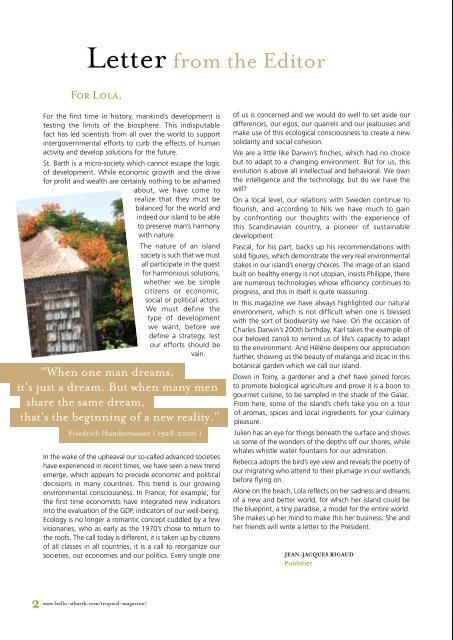Download 2010 Edition - Tropical Magazine
Download 2010 Edition - Tropical Magazine
Download 2010 Edition - Tropical Magazine
You also want an ePaper? Increase the reach of your titles
YUMPU automatically turns print PDFs into web optimized ePapers that Google loves.
Letter from the Editor<br />
For Lola,<br />
For the first time in history, mankind’s development is<br />
testing the limits of the biosphere. This indisputable<br />
fact has led scientists from all over the world to support<br />
intergovernmental efforts to curb the effects of human<br />
activity and develop solutions for the future.<br />
St. Barth is a micro-society which cannot escape the logic<br />
of development. While economic growth and the drive<br />
for profit and wealth are certainly nothing to be ashamed<br />
about, we have come to<br />
realize that they must be<br />
balanced for the world and<br />
indeed our island to be able<br />
to preserve man’s harmony<br />
with nature.<br />
The nature of an island<br />
society is such that we must<br />
all participate in the quest<br />
for harmonious solutions,<br />
whether we be simple<br />
citizens or economic,<br />
social or political actors.<br />
We must define the<br />
type of development<br />
we want, before we<br />
define a strategy, lest<br />
our efforts should be<br />
vain.<br />
"When one man dreams,<br />
it's just a dream. But when many men<br />
share the same dream,<br />
that's the beginning of a new reality."<br />
Friedrich Hundertwasser ( 1928-2000 )<br />
In the wake of the upheaval our so-called advanced societies<br />
have experienced in recent times, we have seen a new trend<br />
emerge, which appears to precede economic and political<br />
decisions in many countries. This trend is our growing<br />
environmental consciousness. In France, for example, for<br />
the first time economists have integrated new indicators<br />
into the evaluation of the GDP, indicators of our well-being.<br />
Ecology is no longer a romantic concept cuddled by a few<br />
visionaries, who as early as the 1970’s chose to return to<br />
the roots. The call today is different, it is taken up by citizens<br />
of all classes in all countries, it is a call to reorganize our<br />
societies, our economies and our politics. Every single one<br />
2 www.hello-stbarth.com/tropical-magazine/<br />
of us is concerned and we would do well to set aside our<br />
differences, our egos, our quarrels and our jealousies and<br />
make use of this ecological consciousness to create a new<br />
solidarity and social cohesion.<br />
We are a little like Darwin’s finches, which had no choice<br />
but to adapt to a changing environment. But for us, this<br />
evolution is above all intellectual and behavioral. We own<br />
the intelligence and the technology, but do we have the<br />
will?<br />
On a local level, our relations with Sweden continue to<br />
flourish, and according to Nils we have much to gain<br />
by confronting our thoughts with the experience of<br />
this Scandinavian country, a pioneer of sustainable<br />
development.<br />
Pascal, for his part, backs up his recommendations with<br />
solid figures, which demonstrate the very real environmental<br />
stakes in our island’s energy choices. The image of an island<br />
built on healthy energy is not utopian, insists Philippe, there<br />
are numerous technologies whose efficiency continues to<br />
progress, and this in itself is quite reassuring.<br />
In this magazine we have always highlighted our natural<br />
environment, which is not difficult when one is blessed<br />
with the sort of biodiversity we have. On the occasion of<br />
Charles Darwin’s 200th birthday, Karl takes the example of<br />
our beloved zanoli to remind us of life’s capacity to adapt<br />
to the environment. And Hélène deepens our appreciation<br />
further, showing us the beauty of malanga and zicac in this<br />
botanical garden which we call our island.<br />
Down in Toiny, a gardener and a chef have joined forces<br />
to promote biological agriculture and prove it is a boon to<br />
gourmet cuisine, to be sampled in the shade of the Gaïac.<br />
From here, some of the island’s chefs take you on a tour<br />
of aromas, spices and local ingredients for your culinary<br />
pleasure.<br />
Julien has an eye for things beneath the surface and shows<br />
us some of the wonders of the depths off our shores, while<br />
whales whistle water fountains for our admiration.<br />
Rebecca adopts the bird’s eye view and reveals the poetry of<br />
our migrating who attend to their plumage in our wetlands<br />
before flying on.<br />
Alone on the beach, Lola reflects on her sadness and dreams<br />
of a new and better world, for which her island could be<br />
the blueprint, a tiny paradise, a model for the entire world.<br />
She makes up her mind to make this her business. She and<br />
her friends will write a letter to the President.<br />
JEAN-JACQUES RIGAUD<br />
Publisher


